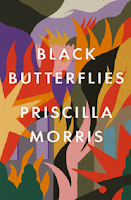Book Review: Black Butterflies by Priscilla Morris

My Rating: 4.5⭐️
Set in 1992 Sarajevo, Black Butterflies by Priscilla Morris is a harrowing (fictional) account of the first year of the Siege as seen from the perspective of fifty- five year old painter and Professor of Art at the Academy of Fine Arts, Zora Kočović, a civilian trapped in the war-torn city that has always been her home.
“Half of Sarajevo is Muslim, a quarter Serb, and fewer than one in ten Croat. A third of marriages are mixed, the children simply calling themselves ‘Yugoslav’.”
Predominantly secular and home to a multi-ethnic population, April 1992 saw Bosnian Serb Nationalists place Sarajevo under siege, intending to remove Bosnian Muslims – an act of “ethnic cleansing”. Anti-nationalist peace marches were met with sniper attacks and widespread violence. Zora, a Serb whose family has called Sarajevo home for generations, is heartbroken with what is happening around her. As the situation begins to worsen she sends her husband and her elderly mother to England to live with her daughter and her family with hopes that the situation is a temporary one and life would return to normal soon enough. Left on her own, she spends her time painting her favorite bridges and landscapes in her studio on the top floor of the Vijećnica (Town Hall), teaching and hoping for better days.
“There’s a new category here now: the good Serb, i.e. the Serb who is not a nationalist, who does not want to divide the country, to ethnically cleanse. I’m constantly having to reassure people that I’m a good Serb. It’s driving me insane.”
But when the unrest intensifies and all avenues to leave are gradually shut down, she is trapped, alone but for her neighbors and students, deriving comfort and support from one another. Braving the elements and coping with food shortages no electricity, no heat and no water while trying to stay alive amid mortar fire and sniper bullets they also bear witness to the destruction of the city they all love and the lives they built around it.
“We’re all refugees now, Zora writes to Franjo. We spend our days waiting for water, for bread, for humanitarian handouts: beggars in our own city.”
This is a brutally honest, informative and hard-hitting story. Given the subject matter, that is not surprising and the author paints a vivid picture of the struggles of daily life amidst a horrific war. Zora’s pain and despair are palpable as she tries to contact her family and find a way to leave when her living conditions become unbearable. While on one hand, the author is brutal in her description of the volatile political climate, violence and horrific living conditions, she also paints a poignant picture of strength and resilience, humanity and a sense of family and unity among those struggling to survive the war. The symbolism of Zora’s art and the significance of the title “Black Butterflies” against the upheaval and devastation Zora witnesses is of particular significance to this story. Zora's art is not only a source of engagement and comfort for her during those difficult times but also provides readers a brief glimpse into the folklore and historical Ottoman architecture of Bosnia-Herzegovina. I would urge you to read the Author’s Note wherein Morris talks about her family and the real events that inspired this novel.
Overall, I found this novel to be a well-researched, beautifully-written work of historical fiction. It is hard to believe that this is the author’s debut novel and I look forward to reading more from this author in the future.
Comments
Post a Comment